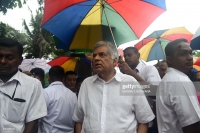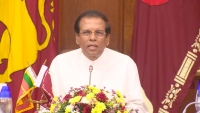The interim report of the Constitutional Assembly’s Steering Committee decrees that Sri Lanka should abolish its Executive Presidency, retain its undivided and indivisible status, and allow maximum devolution to the provinces.
The report, presented to Parliament by Chair, Prime Minister Ranil Wickremesinghe also said specific provisions should be included to prevent secession and that Buddhism should be given the foremost place.
‘There was general consensus that the Executive Presidency as it exists today, be abolished,’ the Interim Report read. ‘The President should be conferred with powers, including those in relation to Provincial Councils in specified situations and the President should be elected by Parliament for a fixed term of office.’
On the topic of the unitary nature of the country, the Interim Report said: ‘The Constitution should specifically state that the Sri Lankan State is “undivided and indivisible.” It should additionally specify that: “No Provincial Council or other authority may declare any part of the territory of Sri Lanka to be a separate State or advocate or take steps towards the secession of any Province or part thereof, from Sri Lanka”.’
‘The President whilst speaking on the Resolution to set up the Constitutional Assembly, stated that whilst people in the south were fearful of the word “federal”, people in the north were fearful of the word “unitary.” A constitution is not a document that people should fear,’ the report said.
‘The classical definition of the English term “unitary state” has undergone change. In the United Kingdom, it is now possible for Northern Ireland and Scotland to move away from the union. Therefore, the English term “Unitary State” will not be appropriate for Sri Lanka.’
‘The Sinhala term “aekiya raajyaya” best describes an undivided and indivisible country. The Tamil language equivalent of this is “orumiththa nadu”.’
‘In these circumstances, the following formulation may be considered:
Sri Lanka (Ceylon) is a free, sovereign and independent Republic which is an aekiya raajyaya / orumiththa nadu, consisting of the institutions of the Centre and of the Provinces which shall exercise power as laid down in the Constitution.
In this Article aekiya raajyaya / orumiththa nadu means a State which is undivided and indivisible, and in which the power to amend the Constitution, or to repeal and replace the Constitution, shall remain with the Parliament and the People of Sri Lanka as provided in this Constitution,’ the interim report stated, in respect of Articles 1 and 2 of Chapter I and II of the Constitution.
The Report said the province should be recognized as the ‘primary unit of devolution’ and that ‘maximum devolution should be granted’ to the provinces.
On giving Buddhism the foremost place, the Interim Report said the following formulations may be considered:
▪ Sri Lanka shall give to Buddhism the foremost place and accordingly it shall be the duty of the State to protect and foster the Buddha Sasana, while assuring to all religions the rights granted by Article 10 and 14(1)(e).
Or
▪ Sri Lanka shall give to Buddhism the foremost place and accordingly it shall be the duty of the State to protect and foster the Buddha Sasana, while treating all religions and beliefs with honour and dignity, and without discrimination, and guaranteeing to all persons the fundamental rights guaranteed by the Constitution.
The Steering Committee, the first sitting of which was held on 5th April 2016 where the 21-member Steering Committee chaired by the Prime Minister Ranil Wickremesinghe, was appointed, had identified 12 main subject areas and assigned six of those subjects to Sub-Committees appointed by the Constitutional Assembly on 05th May 2016.
The Reports of the said six Sub Committees and another report by an ad-hoc Committee appointed by the Steering Committee were tabled before the Constitutional Assembly on 19th November and 10th December 2016.
The Interim Report of the Steering Committee deals with the remaining six subjects that were not assigned to any Sub-Committee and contains principles and formulations that reflect the deliberations of the Steering Committee of the Constitutional Assembly that met 73 times between April 2016 and September 2017.
Included in the Interim Report are observations and comments by Members of the Steering Committee on the principles and formulations contained in the Report.












